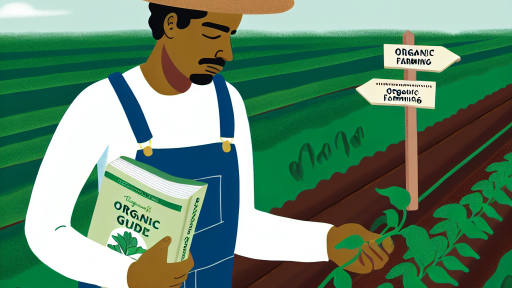Understanding Agricultural Tax Credits and Deductions
Overview of Agricultural Tax Credits
Agricultural tax credits provide financial relief to farmers.
These credits can reduce the amount of tax owed during the year.
Examples include credits for conservation and renewable energy investments.
For instance, the USDA offers credits for adopting soil conservation practices.
These incentives encourage sustainable practices and innovation.
Types of Deductions Available to Farmers
Farmers can claim various deductions on their taxes.
Common deductions include expenses for equipment and supplies.
Additionally, farmers can deduct costs related to land management.
Marketing and advertising expenses are also eligible for deductions.
By effectively using deductions, farmers can reduce their taxable income.
Understanding Qualified Business Income Deduction
The Qualified Business Income deduction offers significant savings.
This deduction allows eligible farmers to deduct up to 20% of their income.
However, specific conditions must be met to qualify.
Consulting with a tax professional can clarify eligibility.
Proper documentation is essential for claiming this deduction.
Transform Your Agribusiness
Unlock your farm's potential with expert advice tailored to your needs. Get actionable steps that drive real results.
Get StartedThe Importance of Record Keeping
Maintaining accurate records is crucial for tax preparation.
Farmers should document all expenses and income thoroughly.
This practice ensures compliance with tax regulations.
Good record-keeping can also maximize available credits and deductions.
Consider using accounting software tailored for farmers to streamline this process.
Consulting with Tax Professionals
Seeking advice from tax professionals can be invaluable.
Tax laws frequently change, and professionals stay updated on new regulations.
They can provide personalized advice based on individual farming operations.
Investing in professional tax services often pays off in increased savings.
Always choose professionals with experience in agricultural tax matters.
Navigating the IRS Forms for Small Farmers
Understanding IRS Forms
Small farmers must understand various IRS forms essential for tax purposes.
The primary form is Schedule F, which reports farm income and expenses.
Additionally, farmers need to be aware of Form 1040, which is the individual income tax form.
Form 4835 may be required for reporting farm rental income.
Each form has specific instructions and requirements for completion.
Common Forms for Small Farmers
Small farmers often use multiple forms to navigate their taxes efficiently.
- Schedule F: Used for business income from farming.
- Form 1040: The standard individual income tax form.
- Form 4835: For reporting farm rental income.
- Form 4562: To claim depreciation on farm assets.
Understanding these forms helps ensure accurate reporting.
Collecting Necessary Documentation
Proper documentation is crucial for filling out IRS forms correctly.
Farmers should keep receipts for all farm-related expenses.
Additionally, they need records for any income generated from sales.
Organizing this documentation simplifies the tax preparation process.
Consulting Tax Professionals
Seeking help from tax professionals can greatly benefit small farmers.
These experts understand IRS regulations and can provide valuable guidance.
They can help farmers maximize deductions and credits they may qualify for.
Showcase Your Farming Business
Publish your professional farming services profile on our blog for a one-time fee of $200 and reach a dedicated audience of farmers and agribusiness owners.
Publish Your ProfileConsulting with a tax professional can save farmers time and money.
Setting Up an Effective Record-Keeping System
A robust record-keeping system is essential for successful farming operations.
Farmers should maintain detailed financial records throughout the year.
Using accounting software can streamline this process significantly.
Regularly updating records helps identify potential tax deductions quickly.
This proactive approach minimizes stress during tax season.
Staying Informed About Changes in Tax Laws
Tax laws frequently change, affecting small farmers’ obligations.
Farmers must stay current on any updates impacting their taxes.
Resources such as the IRS website provide valuable information.
Joining farming associations can also offer insights and updates.
Being informed enables farmers to adapt their tax strategies accordingly.
Impact of Farm Structure on Tax Liabilities
Sole Proprietorship
A sole proprietorship is the simplest business structure.
This setup allows you to report profits and losses on your personal tax return.
Consequently, you avoid double taxation on your earnings.
However, personal liability for business debts is a significant risk.
Your personal assets may be at stake in the event of financial trouble.
Moreover, tax benefits are limited compared to other structures.
Limited Liability Company (LLC)
Forming an LLC provides liability protection for your personal assets.
Additionally, it allows for flexible tax treatment options.
By default, an LLC is a pass-through entity for tax purposes.
This means profits are taxed only on your personal return.
However, you may elect to be taxed as an S corporation.
This can reduce self-employment taxes for some farmers.
Moreover, LLCs offer more credibility with suppliers and lenders.
Corporation
Choosing to form a corporation offers the strongest liability protection.
Corporations are independent legal entities.
Thus, they can own property, enter contracts, and incur debts separately from you.
However, they face double taxation on profits.
First, the corporation pays taxes on its earnings.
Secondly, shareholders pay taxes on dividends received.
While more complex, corporations may benefit from greater financing opportunities.
Comparative Summary
Each farm structure presents unique tax implications.
Understanding these differences is crucial for farmers.
For instance, sole proprietors may face higher personal risk.
On the other hand, LLCs provide flexibility and protection.
Corporations offer strong liability protection at the cost of double taxation.
Ultimately, consider your unique situation and goals.
Consulting with a tax professional can provide tailored advice.
Discover More: Implementing OSHA Standards on Farms
Record Keeping Best Practices for Small Farm Expenses
Importance of Accurate Record Keeping
Accurate record keeping is vital for small farmers.
Showcase Your Farming Business
Publish your professional farming services profile on our blog for a one-time fee of $200 and reach a dedicated audience of farmers and agribusiness owners.
Publish Your ProfileIt helps track expenses related to farming operations.
Additionally, it simplifies tax preparation and compliance.
Moreover, proper records can assist in assessing profitability.
Choosing the Right Tools
Selecting effective record-keeping tools is essential.
Consider using spreadsheets or specific accounting software.
Software can streamline data entry and report generation.
Furthermore, cloud-based solutions provide easy access to data.
Organizing Expenses
Organizing your expenses enhances financial clarity.
Group expenses into categories such as supplies, labor, and equipment.
This organization helps in analyzing spending patterns.
Moreover, it simplifies information retrieval during audits.
Regular Updates and Reviews
Regularly updating records is crucial for accuracy.
Set a specific schedule for entering information.
Weekly or monthly reviews can ensure records are current.
Additionally, these reviews can reveal trends and adjustments needed.
Maintaining Receipts and Documentation
Keep all receipts and supporting documents organized.
Use folders or digital scans for efficient retrieval.
Documentation is essential for justifying expenses during audits.
Furthermore, it can serve as proof of purchases if needed.
Consulting with Professionals
Consider consulting tax professionals for guidance.
CPAs can provide insights on regulatory requirements.
They can also recommend record-keeping practices specific to agriculture.
Additionally, professionals may identify potential tax deductions.
Gain More Insights: Land Use Policy Insights for Farmers
Sales Tax Considerations for Farmers Selling Direct to Consumers
Understanding Sales Tax Obligations
Sales tax varies by state and locality.
Farmers must understand their specific sales tax obligations.
Generally, farmers selling direct to consumers may need to collect sales tax.
However, certain exemptions may apply based on the type of product sold.
Farmers should familiarize themselves with their state’s tax regulations.
Categories of Taxable and Exempt Sales
Typically, tangible personal property is subject to sales tax.
This includes items like vegetables, fruits, and baked goods.
However, some states exempt certain agricultural products from sales tax.
For example, unprocessed food products might be tax-exempt.
Additionally, some sales to nonprofit organizations may also be exempt.
Collecting and Remitting Sales Tax
When farmers sell direct to consumers, they must collect sales tax at the point of sale.
Farmers should provide customers with a receipt showing the sales tax collected.
Next, farmers must report and remit the collected sales tax to the appropriate authority.
This typically occurs quarterly or annually, depending on the state’s requirements.
Farmers should keep accurate records of all transactions for reference.
Local Regulations and Compliance
Farmers should also check for local regulations regarding sales tax.
Showcase Your Farming Business
Publish your professional farming services profile on our blog for a one-time fee of $200 and reach a dedicated audience of farmers and agribusiness owners.
Publish Your ProfileSome cities or counties may impose additional sales taxes.
Furthermore, annual tax filings and updates are crucial for compliance.
Farmers can consult a tax professional for advice on local rules.
Utilizing Tax Exemptions and Deductions
Farmers may also be eligible for various tax exemptions and deductions.
For example, purchasing agricultural supplies may qualify for tax exemption.
Farmers should maintain documentation for any claimed exemptions.
Additionally, staying informed on tax law changes can maximize tax benefits.
Engaging with local agricultural associations may provide valuable resources.
Explore Further: How Trade Policies Affect Farming Operations

Understanding Depreciation of Farm Assets and Equipment
Basics of Depreciation
Depreciation refers to the reduction in value of farm assets over time.
This reduction occurs due to use, wear, and obsolescence.
It is essential for small farmers to understand how depreciation works.
Farmers can take advantage of depreciation deductions on their taxes.
Types of Farm Assets
Farm assets can be classified into various categories.
- Buildings, such as barns and storage facilities.
- Equipment, including tractors and harvesters.
- Vehicles used for farm operations.
- Livestock, which can also depreciate over time.
Methods of Depreciation
Several methods calculate depreciation for tax purposes.
The straight-line method is the simplest and most common.
This method spreads the cost evenly over the asset’s useful life.
Another method is the declining balance method.
This method allows for higher deductions in the early years.
Section 179 Deduction
Section 179 allows farmers to deduct the full purchase price of qualifying equipment.
This encourages farmers to buy equipment rather than lease it.
However, there are limits on the total amount deductible each year.
Farmers should evaluate their purchases to maximize this deduction.
Record Keeping and Documentation
Maintaining accurate records is crucial for claiming depreciation.
Farmers need to keep documents for asset purchases and their usage.
Detailed records support claims during tax filing and audits.
Consider using software specifically designed for farm accounting.
Tax Implications of Depreciation
Understanding tax implications can enhance financial planning.
Depreciation affects both taxable income and cash flow.
Farmers should consult with tax professionals for effective strategies.
Strategic planning can optimize tax savings and reinvestment opportunities.
Delve into the Subject: How Zoning Laws Affect Farm Operations
State-Specific Tax Considerations for Agricultural Businesses
Understanding Local Tax Regulations
Each state has unique tax regulations for agricultural businesses.
Farmers should familiarize themselves with local laws and requirements.
This knowledge can help in compliance and maximizing benefits.
Farm Equipment and Property Tax Exemptions
Many states offer tax exemptions for agricultural equipment.
Farm property may also be subject to reduced tax rates.
Farmers should research these exemptions for their area.
Such savings can significantly impact a farm’s bottom line.
Sales Tax on Agricultural Products
States differ in their approach to sales tax on agricultural products.
Showcase Your Farming Business
Publish your professional farming services profile on our blog for a one-time fee of $200 and reach a dedicated audience of farmers and agribusiness owners.
Publish Your ProfileSome states exempt certain products from sales tax entirely.
Others offer exemptions based on the type of product sold.
Understanding these differences can lead to cost savings.
Income Tax Considerations
Farmers should be aware of state-specific income tax rules.
Some states may offer special deductions for agricultural income.
This can include deductions for farming expenses and losses.
Additionally, tax credits for sustainable practices may apply.
Impact of Federal Programs on State Taxes
Federal agricultural programs can influence state tax policies.
States may adjust their tax codes based on federal changes.
Farmers should monitor how these adjustments affect their taxes.
Consulting with Tax Professionals
Engaging a tax professional can provide valuable insights.
They can ensure compliance and identify available deductions.
Moreover, they can help navigate complex tax regulations.
This partnership can lead to better financial outcomes for farmers.
Tax Implications of Farm Income Variability and Losses
Understanding Income Variability
Farm income often fluctuates due to various factors.
Weather patterns significantly affect crop yield and livestock production.
Market prices for agricultural products can also vary greatly.
Consequently, farmers might experience inconsistent income each year.
Tax Treatment of Farm Income
Farmers report their income differently than regular businesses.
Generally, they use the cash method for reporting income.
This method allows them to record income as it is actually received.
Thus, the timing of income realization becomes crucial for tax purposes.
Dealing with Losses
Farmers may encounter years with substantial losses.
Understanding how to claim these losses is essential.
Losses can offset other sources of income, reducing overall tax liability.
Farmers can carry back losses for up to two years.
Additionally, they can carry losses forward for up to 20 years.
Farm Income Averaging
Farm income averaging helps mitigate the impact of income variability.
This option allows farmers to average their income over three years.
Consequently, it can lower tax liability in high-income years.
Farmers must elect this option when filing taxes.
Tax Credits and Deductions
Farmers can benefit from various tax credits and deductions.
Examples include deductions for operating expenses like feed and fertilizer.
They can also claim credits for investing in sustainable practices.
Understanding eligible expenses maximizes tax benefits.
Consulting a Tax Professional
Given the complexities of agricultural taxes, consulting a tax professional is wise.
An expert can provide tailored advice based on an individual farm’s circumstances.
Furthermore, they keep current with changes in tax legislation.
This ensures farmers take full advantage of available benefits.
Additional Resources
ZONING FOR URBAN AGRICULTURE | Healthy Food Policy Project
Showcase Your Farming Business
Publish your professional farming services profile on our blog for a one-time fee of $200 and reach a dedicated audience of farmers and agribusiness owners.
Publish Your ProfileBuilding a Resilient Biomass Supply: A Plan to Enable the …




